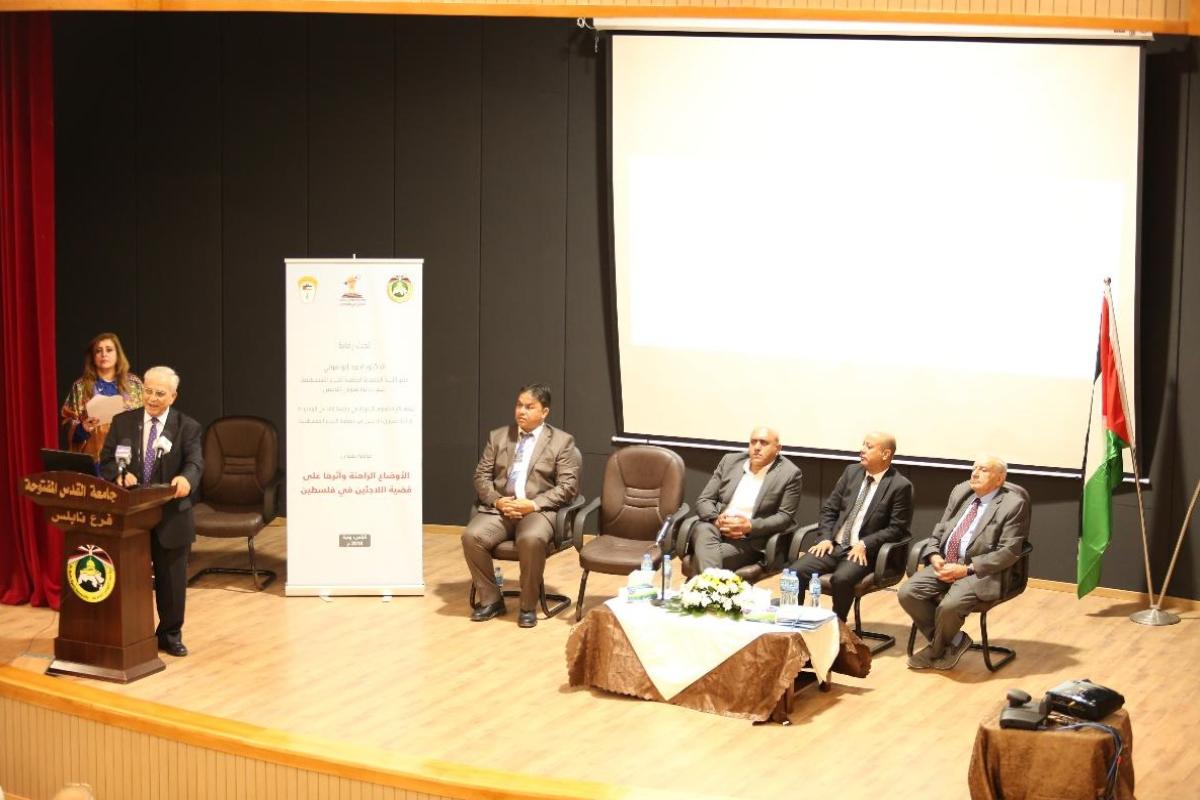
On Wednesday 10/10/2018, the Faculty of Educational Sciences at QOU and the Department of Refugees Affairs at PLO organize “The Current Situation and its Impact on the Palestinian Refugee Issue” Conference under the auspices of Dr. Ahmed Abu Holy, member of the executive committee of PLO, head of the department of Refugees Affairs. The conference took place at the University Theater in Nablus and via video conference with Gaza Strip.
The conference was attended by member of the executive committee of PLO and head of the department of Refugees Affairs Dr. Ahmed Abu Holy, Nablus Governor Major General Akram Al-Rjoub, Chairman of QOU board of trustees Eng. Adnan Samarah, QOU President Prof. Younis Amr, Businessman Eng. Muneeb Al-Masri , in addition to members of Fatah Central Committee and Revolutionary Council, branches directors, faculties deans and centers directors. The conference included an exhibition that reflects the Palestinian refugees’ sufferings through a collection of photos that documented the different stages of refuge. The participants recommended the importance of resisting the calls to stop the work of UNRWA before finding a just and permanent solution for the Palestinian refugees cause.
Conference sessions
The conference included three sessions; the first entitled “UNRWA and the Refugees Cause” and was headed by Prof. Abdulrahman Al-Maghribi. The session included a number of scientific papers that discuss the situation of UNRWA under the changing world politics and environment. The second session was held under the title “the challenges that face the Palestinian refugees (political and legal)” and was headed by Mr. Yaser Abu Kishek. The session also included a number of scientific papers by scholars from different universities in the region. The third and last session was entitled “the economic and social situations of the Palestinian refugees” and was headed by Mr. Mohammed Elyyan.
Recommendations
The participants stressed the importance of paying attention to the second paragraph of article (D) of the 1951 agreement about the situation of the Palestinian refugees. The participants believed that the U.S. and Israel’s success in changing the directions of the UNRWA’s commission based on decision 302 through acquiring the general assembly’s agreement to integrate this delegation in the UNHCR responsibilities, which means cancelling decision 302. They also confirmed the importance of developing an Arab national strategic plan to confront the American administration policies that harm the rights of the Palestinian people since the risks do not affect the Palestinians only, but also affects the Arab people. Thus, the Arab countries should increase the financial support for UNRWA and coordinate with the BRICS countries (Russia, China, India, Brazil and South Africa) to increase their financial support to UNRWA as well. The participants stressed the urgent need to stress on the parties that plan the UNRWA policies, which are the UN General Assembly, the Advisory Committee and the donor Conference in order to find a stable resource and enough budget for UNRWA. They also called for unifying the national efforts to enhance the right to return and to have a comprehensive work from the different sectors (formal, civil, private and social sectors) to achieve the national efforts that serve the refugees cause.